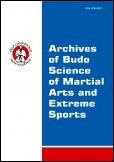2016, Volume 12, Issue 1
Empirical justifying the possibility of educating specialists of the mountain rescue on subject of the medical rescue - example of Poland
Robert Bąk1, Roman Maciej Kalina2
1Faculty of Physical Education, University of Rzeszów, Rzeszów, Poland
2Department of Combat Sports, Gdansk University of Physical Education and Sport, Gdansk, Poland
Author for correspondence: Robert Bąk; Faculty of Physical Education, University of Rzeszów, Rzeszów, Poland; email: robo[at]interia.pl
Full text
Abstract
Background and Study Aim: The dynamics of interest, especially in wealth societies, of the extreme forms of physical activity (EFPA) is overtaking a rational organizational solutions, technological and as well as technological and educational aimed at providing an optimal safety for participants. Mountain environment is attractive for people all year, regardless of nationality, age, gender, health status and other personal virtues. However, there are not reasonably using the resources of people who can pursue their passions of life in mountain rescue services in the professional course or as volunteer. The aim of the research is knowledge of the preferred forms of extreme physical activity of students of different faculties in terms of their willingness to specialize in the widely understood mountain rescue.
Material and Methods: We analysed declarations 424 students of the University of Rzeszów (Poland) divided into: life sciences (n = 219), humanities, social and arts sciences (n = 115), technical sciences (n = 90).
Results: Willingness to work or to volunteer in the rescue services (but not everyone with EFPA experience) declared 183 students (43% of 424), including the most numerous: 134 (61% of 219) life sciences; 39 (31% of 125) humanities, social and arts sciences; 13 (14% of 90) technical sciences. Leaders of ranking students (in %), who declared willingness to work or to volunteer in the rescue services (but not everyone with EFPA experience) are: emergency medical care 90% (38 of 42); tourism and recreation 67% (81 of 121); (pedagogy 61% (23 of 38). The leader still among 72 students who declared EFPA are: 15 students of emergency medical care; 12 ex aequo tourism and recreation; physics; 10 physical education.
Conclusions: According to the criteria of the Bologna Declaration of flexible studying the research findings are making the possibility of creating on the course of emergency medical care the specialty advanced mountain rescue. They are empirically reasonable grounds to create on universities and colleges the multidirectional inter units classes for potential groups of volunteers not only mountain rescue.
Key words: extreme sports, medical rescue, inter course, Bologna Declaration, sport education





